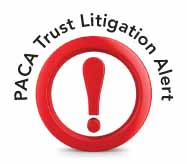 FDA’s INCREASED RECORDS ACCESS AUTHORITY
FDA’s INCREASED RECORDS ACCESS AUTHORITY
Section 101 of FSMA amends the FD&C Act to increase the FDA’s authority to access and copy records. Prior to the passage of FSMA, the Food Drug & Cosmetic Act (FD&C) provided the FDA access to records relating to food reasonably believed to be adulterated and presents a threat of serious adverse health consequences or death to humans or animals. FSMA expands this access to records beyond those relating to a specific suspect article of food to records relating to any other article of food the FDA reasonably believes is likely to be affected in a similar manner.
This new grant of authority permits FDA inspectors to significantly expand the scope of their investigation as they are no longer confined to specific articles of food identified in a complaint as being potentially adulterated.
When the FDA may access and copy records:
Under FSMA, the FDA may access and copy records from domestic and foreign food companies who manufacture, process, pack, transport, distribute, receive, hold, or import food in either of the following two situations: (1) the FDA has a reasonable belief the food, and any other food articles likely to be affected in a similar manner, are (i) adulterated, and (ii) presents a threat of serious adverse health consequences or death to humans or animals; or (2) the FDA believes there is a reasonable probability that the use or exposure to an article of food, and any other article of food likely to be affected in a similar manner, will cause serious adverse health consequences or death to humans or animals.
Importantly, FSMA grants the FDA access to the records of both the domestic importer and its foreign supplier. This is consistent with FSMA’s goal of making importers responsible for ensuring food from abroad is as safe as any of our domestic products.
To be more clear, FSMA’s enlargement of FDA authority to access and copy records extends to those records required to be kept by law (e.g., FD&C Act, Bioterrorism Act, etc.), as well as any other records related to the manufacture, processing, packing, transportation, distribution, receipt, holding, or importation of the suspect food. This applies to records maintained by or on behalf of the company in any format and at any location. Examples of records the FDA can access include raw materials receipts; customer distribution lists; manufacturing, test, and recall records; and complaint and adverse event records.
Records the FDA may NOT access and copy:
Notwithstanding FSMA, the FDA may NOT access and copy the following types of records:
- Records from farms, which include facilities that pack, hold, or manufacture/process food, provided all food used in such activities is grown, raised, or consumed on that farm or another farm under the same ownership
- Records from restaurants
- Records relating to food that is within the exclusive jurisdiction of the Secretary of Agriculture
- Recipes, which are defined as formulas that include: (i) ingredients; (ii) quantities, and; (iii) instructions necessary to manufacture a food
- Financial, pricing, personnel, or research data
- Sales data (other than shipment) regarding sales
Privacy protection
The FDA may lawfully obtain information under FSMA that includes non-public confidential or trade secret information. This reality must be reconciled with those laws that govern the FDA’s disclosure of information to the public. For example, can third parties gain access to non-public confidential information provided to the FDA with a Freedom of Information Act request? The answer: YES… It could happen. As it stands now, the FDA will only confirm that its personnel will comply with all applicable protections, procedures, and legal requirements that are intended to protect against the unauthorized or accidental disclosure of nonpublic information.
Refusing to turn over records to the FDA
A refusal to permit the FDA access to or copying of records is prohibited by FSMA; in response, the FDA may initiate a regulatory, civil, or criminal action in connection with the records access request, refuse admission of food offered for import into theU.S., etc. Separate and apart from a records access request, the FDA may also pursue actions such as suspension of a food facility’s registration (preventing imports/exports or selling food domestically), administrative detention or seizure of food, issuance of a mandatory recall order, or an injunction against the company.





